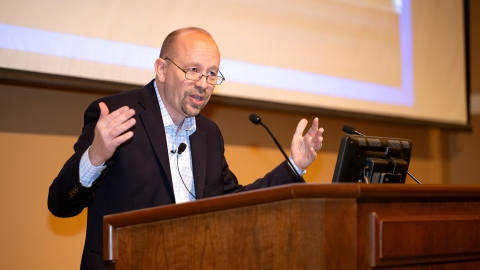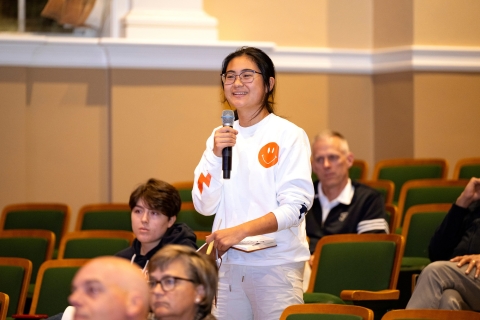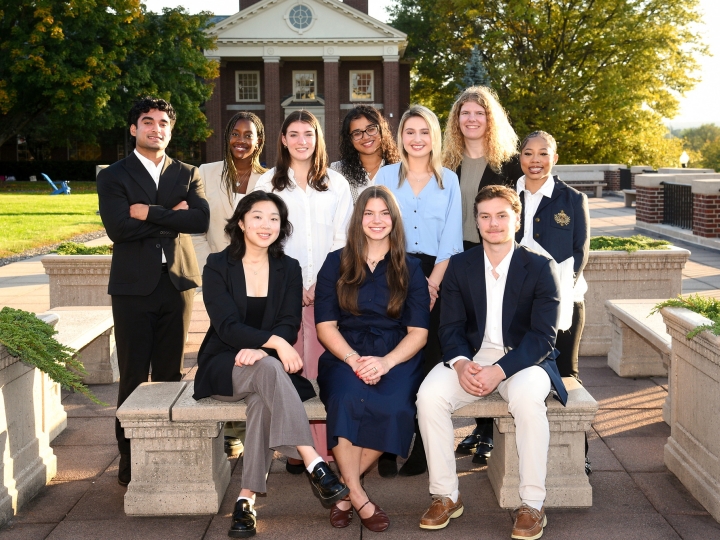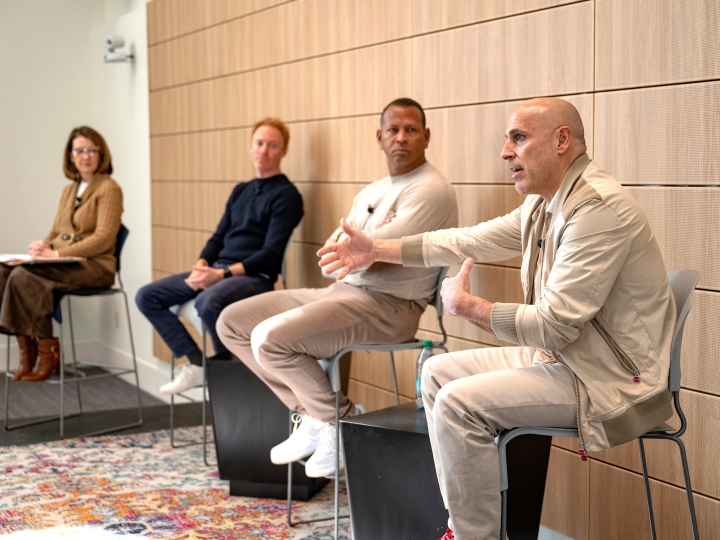
Jon A. Shields Dissects Wyoming Republicans During Bucknell Forum Talk
October 18, 2023
Jon A. Shields was the second of five nationally renowned speakers to participate in the 2023-24 Bucknell Forum, which centers on the theme "Freedom of Expression."
A failed vote to fill the vacant Speaker of the House seat foreshadowed a timely and insightful Bucknell Forum talk, delivered by Jon A. Shields on Oct. 17.
Shields — a professor of American politics and chair of the government department at Claremont McKenna College and author/co-author of three books on the American right — explored the dynamics of the Republican party as the second speaker in Bucknell's 2023-24 Forum Series, which is focused on "Freedom of Expression." The moderate Republican spoke about the cancel culture that exists within the party, despite its claim of partisan agreement.
To illustrate the influence of identity politics, Shields delved into his latest research, which is largely focused on party dynamics in the state of Wyoming. He marked the repercussions of former U.S. Representative Liz Cheney's decision to vote in favor of former President Donald Trump's impeachment in the aftermath of the January 6 insurrection as a key tipping point. Her decision deeply divided her party, causing a rift between those who supported her and those who opposed her standing.
Having spent considerable time in Wyoming attending state party conventions and interacting with party leadership, Shields observed the party split first hand.
New leaders have emerged from non-traditional backgrounds: Barbers, exterminators and high school dropouts with GEDs are taking control from the doctors, lawyers and oil magnates. The shift in power, he said, is polarizing. "Class warfare of the time is breaking down inside the party," he said.
He noted the ways emerging members virtue signal their "authentically conservative social identity," not only through their unconventionality and history of being on the fringe of policy making, but also through their appearance. As the divide has become more evident, guns in holsters and cowboy hats have been adopted as the costume of the new far right in Wyoming.
Even more disruptive is the censorship imposed on those who don't align with the new ideals. These strong displays of steadfast loyalty to a conservative ideology are coupled with scrutiny that results in the exclusion of anyone who doesn't conform — a situation Shields witnessed in the removal of delegates from dissenting counties during conventions.
Wyoming, Shields implied, is in some ways indicative of the larger movement within the party. "Republicans in both camps have a fundamentally different sense of what politics is," he said. "They have a different sense of what it should be about. They have a different sense of what its purposes are."

Shields took questions from Bucknell students on the issues of media influence, open discussion with peers and the rapid division in and amongst parties. "One of the reasons I stress that classrooms and colleges should be schools of democracy is because you kind of have to learn by doing," Shields said. "There has to be some willingness to know you're going to mess it up. … I think there should be some tolerance for some intolerance. Tolerance for the sharpness of people's points of view. Sometimes things will get personal or testy. And you'll get better by it — we all do."
Pivoting to the role of the higher education system as partisan politics evolve, he suggested a challenge to what he calls the dominant liberal culture in academia. He offered advice to institutions hoping to invite healthy discourse and keep freedom of expression ahead of cancel culture, and progress ahead of partisan identity. "To fight cancel culture," he said, "institutions need to diversify."
He asked forgiveness for his sentiment before closing his keynote: "I'm hoping that America's small colleges will become great again."
Up Next
"Freedom of Expression" continues when the Bucknell Forum speaker series welcomes Jodi Picoult on Tuesday, Jan. 23, 2024 at the Weis Center for the Performing Arts. Picoult is the No. 1 New York Times bestselling author of 28 novels. She is the recipient of many awards, including the New England Bookseller Award for Fiction, the Alex Awards from the Young Adult Library Services Association, a lifetime achievement award for mainstream fiction from the Romance Writers of America, the New Hampshire Literary Award for Outstanding Literary Merit, and the Sarah Josepha Hale Award.

